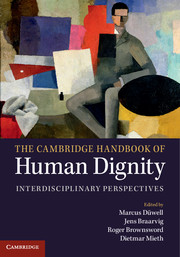Book contents
- Frontmatter
- Contents
- List of contributors
- Foreword
- Why a handbook on human dignity?
- Acknowledgments
- 1 Human dignity from a legal perspective
- 2 Human dignity: concepts, discussions, philosophical perspectives
- Part I Origins of the concept in European history
- Part II Beyond the scope of the European tradition
- Part III Systematic conceptualization
- Part IV Legal implementation
- 36 Equal dignity in international human rights
- 37 Is human dignity a useless concept? Legal perspectives
- 38 Human dignity in French law
- 39 Human dignity in German law
- 40 Human dignity in US law
- 41 Human dignity in South American law
- 42 Human dignity in South African law
- 43 The Islamic world and the alternative declarations of human rights
- 44 The protection of human dignity under Chinese law
- 45 Human dignity in Japanese law
- 46 The place of dignity in the Indian Constitution
- Part V Conflicts and violence
- Part VI Contexts of justice
- Part VII Biology and bioethics
- Appendix 1 Further reading
- Appendix 2 Universal Declaration of Human Rights
- Index
- References
36 - Equal dignity in international human rights
from Part IV - Legal implementation
Published online by Cambridge University Press: 05 March 2015
- Frontmatter
- Contents
- List of contributors
- Foreword
- Why a handbook on human dignity?
- Acknowledgments
- 1 Human dignity from a legal perspective
- 2 Human dignity: concepts, discussions, philosophical perspectives
- Part I Origins of the concept in European history
- Part II Beyond the scope of the European tradition
- Part III Systematic conceptualization
- Part IV Legal implementation
- 36 Equal dignity in international human rights
- 37 Is human dignity a useless concept? Legal perspectives
- 38 Human dignity in French law
- 39 Human dignity in German law
- 40 Human dignity in US law
- 41 Human dignity in South American law
- 42 Human dignity in South African law
- 43 The Islamic world and the alternative declarations of human rights
- 44 The protection of human dignity under Chinese law
- 45 Human dignity in Japanese law
- 46 The place of dignity in the Indian Constitution
- Part V Conflicts and violence
- Part VI Contexts of justice
- Part VII Biology and bioethics
- Appendix 1 Further reading
- Appendix 2 Universal Declaration of Human Rights
- Index
- References
Summary
Two genealogies of human rights
Human rights reflect a determined effort to protect the dignity of each and every human being against abuse of power through fundamental rights. Notably, in the global political idea of human rights that emerged after the Second World War, two genealogies converged: first, the fight for universal recognition and equal protection of the dignity of each and every human being; and, second, the struggle for inalienable fundamental rights as a way to protect citizens against abuse of power, in particular by their own sovereign (the state).
Strikingly, while the emergence of the basic rights idea as legal protection against abuse of power, particularly by one's own sovereign, may indeed be called a ‘Western’ history, the narrative of universal recognition and protection of human dignity could just as well be termed ‘anti-Western’ history in the sense that equal dignity had to be vindicated in contravention of Western ideas and powers. For instance, the idea of legal principles was already part of Roman law (generalia iuris principia). One of these referred to freedom as something of inestimable value (libertas inaestimabilis res est); yet the application of this principle excluded subjugated peoples in general and slaves in particular. In fact, the whole story of the realization of universal human dignity must be understood as an ongoing political struggle. Indeed, the struggles against colonization and conquest, and the historical efforts to fight racial and ethnic hierarchy, have shaped the idea of truly universal human rights (Gilroy 2009).
- Type
- Chapter
- Information
- The Cambridge Handbook of Human DignityInterdisciplinary Perspectives, pp. 355 - 361Publisher: Cambridge University PressPrint publication year: 2014
References
- 1
- Cited by



